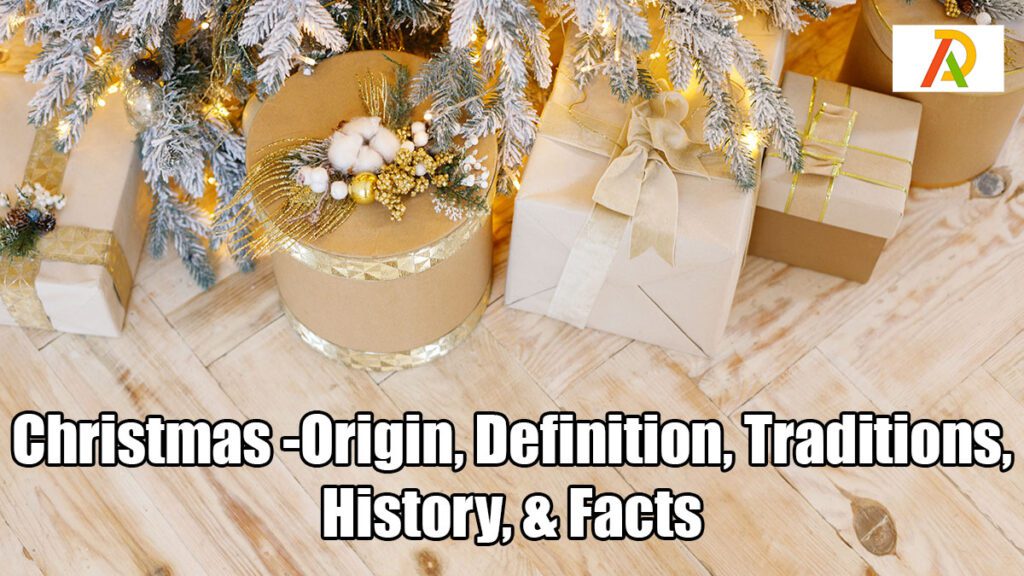Christmas -Origin, Definition, Traditions, History, & Facts

Christmas is an annual festival commemorating the birth of Jesus Christ, observed most commonly on December 25 as a religious and cultural celebration among billions worldwide. A feast central to the Christian liturgical year is prepared for by the season of Advent or Nativity Fast and initiates the twelve days of Christmastide, which ends after the twelfth night. Christmas Day is a public holiday in many of the world’s nations, is celebrated culturally by many non-Christian people, and is an integral part of the Christmas and holiday season.
Origin of Christmas
The first recorded Christmas celebration was in Rome in 336 A.D. The holiday was called the Feast of the Nativity and celebrated the birth of Jesus Christ. Christmas soon became a Christian holiday and spread throughout the world.
Christmas is named after Jesus Christ because he was born on December 25. The word “Christ” comes from the Greek word “Christos,” which means “anointed one” or “savior.”
The tradition of celebrating Christmas on December 25 started in the early 4th century when Roman Emperor Constantine declared that date as the official day to celebrate the birth of Jesus Christ. This date was chosen because it coincided with the pagan celebrations of the Winter Solstice, which marked the shortest day and longest night of the year.
Over time, Christmas has become a secular holiday enjoyed by people of all religions and cultures. Many popular Christmas traditions, such as gift-giving and decorating evergreen trees, originated from pagan customs.
Definition of Christmas
Christmas is an annual festival commemorating the birth of Jesus Christ, observed most commonly on December 25 as a religious and cultural celebration among billions worldwide. A feast central to the Christian liturgical year, it is prepared for by the season of Advent or Nativity Fast and initiates the season of Christmastide, which historically in the West lasts twelve days and culminates on the Twelfth Night; in some traditions, Christmastide includes an octave. Christmas Day is a public holiday in many of the world’s nations, is celebrated culturally by many non-Christian people, and is an integral part of the Christmas and holiday season.
Traditions of Christmas
Christmas is celebrated in many different ways worldwide, but many cultures share common traditions. One of the most popular traditions is exchanging gifts, which dates back to the story of the three wise men bringing gifts to baby Jesus. Another popular tradition is decorating homes and Christmas trees with lights and ornaments. This tradition began in Germany, where people decorate evergreen trees with candles to symbolize hope and new life during the dark winter.
Santa Claus is a very important part of Christmas in the United States. Children leave out cookies and milk for Santa on Christmas Eve, and he rewards them with presents if they have been good all year. The tradition of Santa Claus coming down the chimney originated in America, where Clement Clarke Moore created it in his 1823 poem “AVisit from St. Nicholas.”
Christmas carols are also sung all around the world during the holiday season. These songs originally started as religious hymns, but over time they have become secular songs that celebrate the joys of Christmas. Some of the most popular carols include “Silent Night,” “Joy to the World,” and “O Come All Ye Faithful.”
No matter what traditions you celebrate during Christmas, it is a time to come together with family and friends to enjoy each other’s company and spread holiday cheer!
History of Christmas
Christmas is a holiday that celebrates the birth of Jesus Christ. The word “Christmas” comes from the old English “Cristes maesse,” or the mass of Christ. The first recorded Christmas celebration was in Rome in 336 AD.
The holiday was brought to England by St. Augustine in 597 AD. Christianity had not yet taken hold in Britain, and many native people still worshipped pagan gods. To convert them, Augustine decided to combine pagan celebrations with Christian ones. This is how many of our Christmas traditions got their start, including decorating evergreen trees, giving gifts, and lighting candles.
Over the centuries, Christmas has evolved into the holiday we know today. Christmas has become a time for family gatherings, gift-giving, and religious observances in America. Our Christmas traditions come from other cultures, such as Germany and France. And while some people see Christmas as a purely religious holiday, others see it as a time to celebrate family, friends, and love.
Facts about Christmas
Christmas is an annual festival commemorating the birth of Jesus Christ, observed most commonly on December 25 as a religious and cultural celebration among billions worldwide. A feast central to the Christian liturgical year, it is prepared for by the season of Advent or Nativity Fast and initiates the season of Christmastide, which historically in the West lasts twelve days and culminates on the Twelfth Night; in some traditions, Christmastide includes an Octave. Christmas Day is a public holiday in many of the world’s nations, is celebrated culturally by many non-Christian people, and is an integral part of the Christmas and holiday season.
How to celebrate Christmas
Christmas is a Christian holiday that celebrates the birth of Jesus Christ and is celebrated on December 25 each year. Christians believe that Jesus is the Son of God and the world’s Savior.
Christmas traditions vary from country to country, but some common ones include decorating homes and workplaces with Christmas trees and lights, exchanging gifts, attending special church services, eating festive meals, and sharing holiday greetings with friends and family.
Santa Claus is thought to bring gifts to children on Christmas Eve in many parts of the world. This legend likely originated with Saint Nicholas, a kind-hearted man known for giving gifts to those in need. The story of Santa Claus has evolved over time and now includes elements of magic and fantasy enjoyed by both children and adults.
Whether religious or not, Christmas can be a fun and enjoyable time for all. So how can you celebrate Christmas? Here are some ideas:
- Decorate your home or workplace with Christmas trees, lights, and other festive decorations.
- Exchange gifts with family members, friends, or colleagues. If you don’t have anyone to exchange gifts with, consider donating to a local charity or buying a gift for someone less fortunate than yourself.
- Attend a special church service or musical performance. Many churches offer special services during the holidays, such as candlelight vigils or live nativities.
- Enjoy a festive meal with your loved ones.
Conclusion
Christmas is a holiday that has been around for centuries and has undergone many changes. Today, Christmas is celebrated by millions of people around the world and is a time for giving, spending time with family, and eating festive foods. Whether you celebrate Christmas or not, it is a holiday that has come to be synonymous with joy and happiness.


